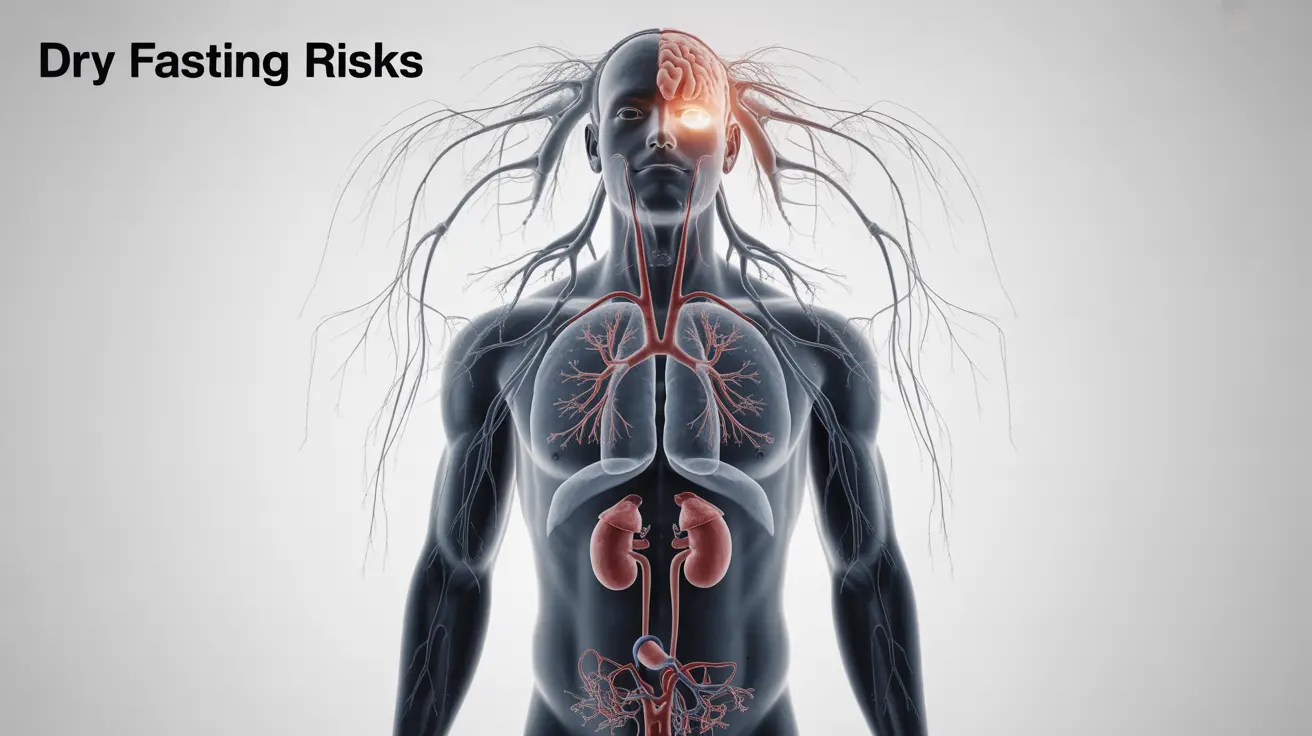Dry fasting, a controversial fasting method where individuals abstain from both food and water, has gained attention in certain wellness circles. While some proponents claim various health benefits, it's crucial to understand the significant risks and medical implications of this extreme fasting approach before considering it.
This comprehensive guide examines the effects of dry fasting on the body, its potential dangers, and why medical professionals generally advise against this practice. We'll explore who should avoid it entirely and compare it to other, safer fasting methods.
Understanding Dry Fasting and Its Impact on the Body
Dry fasting involves completely abstaining from both food and water intake for a specific period. Unlike other fasting methods, this practice prevents the body from receiving any form of hydration, which can rapidly lead to serious health complications.
During dry fasting, your body experiences significant physiological changes as it struggles to maintain essential functions without water, which is crucial for countless bodily processes.
Dangers and Health Risks
The risks associated with dry fasting are numerous and potentially severe:
- Severe dehydration
- Electrolyte imbalances
- Kidney stress and potential damage
- Blood pressure fluctuations
- Cognitive impairment
- Fainting and dizziness
- Increased risk of heat exhaustion
These risks can become life-threatening, especially in hot weather or during physical activity.
Signs of Dehydration During Dry Fasting
Recognizing dehydration symptoms is crucial. Watch for:
- Dark yellow or amber-colored urine
- Extreme thirst
- Dry mouth and lips
- Decreased urination
- Headaches
- Fatigue and weakness
- Confusion or irritability
Comparing Fasting Methods
Unlike dry fasting, other fasting methods maintain hydration while offering potential health benefits:
Water Fasting
Allows water consumption while abstaining from food, maintaining essential hydration levels and being generally safer than dry fasting.
Intermittent Fasting
Involves specific eating windows while maintaining normal water intake, offering a more sustainable approach to fasting benefits.
Weight Loss and Dry Fasting
While dry fasting may lead to rapid weight loss, most of this is water weight that returns quickly upon resuming normal eating and drinking. This type of weight loss can be dangerous and isn't sustainable for long-term health goals.
Medical Contraindications
Several groups should never attempt dry fasting:
- Pregnant or breastfeeding women
- People with diabetes
- Those with kidney disease
- Individuals with heart conditions
- People taking certain medications
- Athletes and physically active individuals
- Anyone with a history of eating disorders
Frequently Asked Questions
What are the health risks associated with dry fasting and how can I recognize dehydration symptoms?
The main health risks include severe dehydration, kidney stress, electrolyte imbalances, and potential organ damage. Key dehydration symptoms include dark urine, extreme thirst, dry mouth, decreased urination, headaches, and confusion. These symptoms can rapidly become dangerous and require immediate medical attention.
How does dry fasting differ from other types of fasting like water fasting or intermittent fasting?
Dry fasting prohibits both food and water intake, making it significantly more extreme than water fasting (which allows water) or intermittent fasting (which restricts eating to specific time windows while maintaining hydration). These alternatives are generally safer and more sustainable.
Can dry fasting effectively promote weight loss and what happens to the weight lost during this practice?
While dry fasting can lead to rapid weight loss, it's primarily water weight that returns once normal eating and drinking resume. This weight loss method is neither healthy nor sustainable and can lead to dangerous dehydration.
Who should avoid dry fasting due to health or medical conditions?
Pregnant women, people with diabetes, kidney disease, heart conditions, those taking medications, athletes, and individuals with eating disorders should absolutely avoid dry fasting. The risks far outweigh any potential benefits for these groups.
Are there any proven benefits of dry fasting, and is it safe to try without medical supervision?
There is limited scientific evidence supporting the benefits of dry fasting, while the risks are well-documented. It is not recommended to attempt dry fasting without medical supervision, as the practice can quickly lead to dangerous complications.




